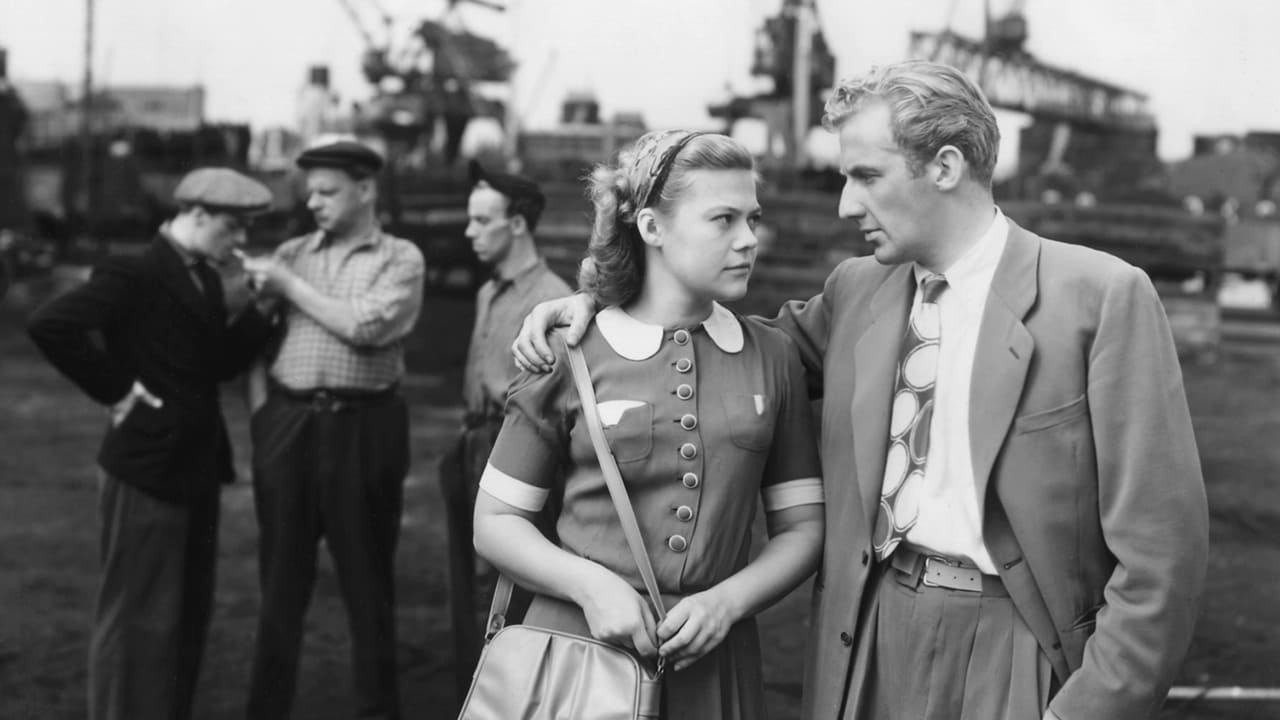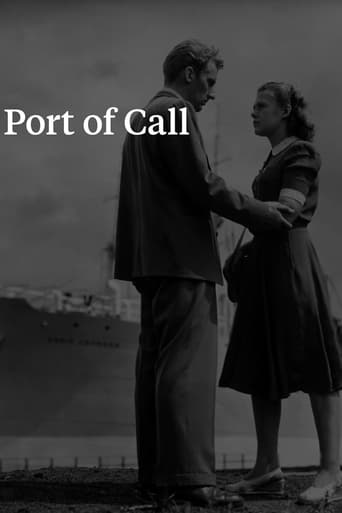Lovesusti
The Worst Film Ever
Supelice
Dreadfully Boring
Hadrina
The movie's neither hopeful in contrived ways, nor hopeless in different contrived ways. Somehow it manages to be wonderful
Yash Wade
Close shines in drama with strong language, adult themes.
Richard Chatten
Set in Gothenberg, 'Hamnstad' was Bergman's fifth feature film, his first with cameraman Gunnar Fischer, and concludes his early "neo-realist" phase - there's still plenty of documentary footage of blue collar working life and its all rather more sordid than his later films, including a harrowing section involving an abortion - but much more sparing use is made of Erland von Koch's than hitherto in anticipation of the more laid-back approach he was soon to adopt.
Hitchcoc
One can see the beginnings of some pretty wonderful cinematography in this early work by Ingmar Bergman. It is a slice of life story about two down-and-outers who have been dealt a bad hand. The young woman has a sparkle, despite growing from an abusive family situation. She is dominated by her mother. She has spent time in a reformatory because her life is intolerable and she turns to a man who kindly takes her in. Because of her age, the mother can do what she wants. The sailor is a man who has just arrived at this port of call. His first act upon coming ashore is to rescue the young woman, who has decided top end it all by jumping in the harbor. Their paths cross again and it develops into a tenuous relationship. His first act is to get her into bed, but over time he realizes that she is all he has. Bergman does a nice job of making these people real. She has all kinds of demons and he has trouble accepting her morose being. She has a right to feel the way she does and he really is an unfeeling cad. If one is willing, he can see the framing of scenes, the positions of actors, and some pretty interesting symbols. It is a claustrophobic film. Outdoor scenes are scenes of freedom, even the suicide attempt; and indoor the forces of the outside close in. See this as a foundation piece.
MartinHafer
While it is true that Swedish films were far more permissive in the 1940s, how frank this film is might surprise you--especially as it's quite a bit more so than director Bergman's later films.The film begins with Gösta returning from several years at sea. He's tired of the life and settles into the life of a dockworker. Very soon after, he meets a young lady (Berit) at a dance hall and they sleep together that same night. Berit worries that it's just a one night stand but Gösta does return later. However, Berit also worries that he won't stick around when he learns her past--she's been to reform school and is a mess. When she finally tells him, he doesn't know what to do. To make it worse, soon she brings a dying friend to his apartment--and she's sure there's no way he'll stick around now. Is there any hope for this couple? Aside from premarital sex, the film also deals with family dysfunction and a botched illegal abortion--all in a very non-judgmental manner. I am pretty sure it caused a bit of a stir in its day. I admired it because in just about every way the film tried very hard to deal with reality and avoid clichés. And, to avoid clichés, the film ends with many, many questions unanswered--just like in real life. It was all handled so well that I can't help but admire the film and feel it's actually a lot better than much of Ingmar Bergman's later more celebrated work, as it's simpler and less focused on depression (like many of his 1960s-70s films). Well worth seeing.
theachilles
While Gosta, a seaman, arrives in Gothenburg, a young girl, Berit, makes a suicide attempt in the city harbour. After saving her, a rather promising relationship seems to begin but much work needs to be done from both of them in order to be together. In 1948, Ingmar Bergman seems already familiar with the themes that he will never stop examining throughout his career. He observes and studies human behavior in everyday circumstances, in an effort to get a glimpse of its roots. Berit is depressed, but her situation has a long story, starting from her childhood. Growing up with a mother that never cared for anything and anyone but herself and a father that had a problem hiding his temper, she ended up in a reform school and the implications are therefore predictable. Gosta has just finished working in the ships and he finds himself working in the docks of Gothenburg, despite his ambition for something bigger. They are both in the need of a clean start in their lives, carrying their burdens from the past on the left and their dreams for the future on the right. When they first meet, they can't possibly imagine how similar they are. In fact, they seem incapable of realizing anything because of the wall they have built around them in order to protect themselves. But she desperately needs to free herself from her mother (who impersonates all of her past) and he desperately needs to find someone to relief him from his loneliness. So, they will fight through all the difficulties for these goals. Eventually, she will learn to have some faith in other people, he will learn to forgive and they will both learn to face the past. This film also works on a political level as the story takes place among the dock workers struggling everyday just for the essentials. Bergman himself admits the influence that the Italian Neo-Realists had on him in his first films and Port of Call is a characteristic example. It is mostly shot on location and the work in cinematography is really admirable, the black and white photography and the camera movement is stunning and Bergman proves how talented he is when it comes to framing. The leading actors give notable performances, especially Nine-Christine Jonsson. Overall, Port of Call is an interesting film, a typical example of the first period in Bergman's filmography that will reach its climax with "Summer with Monika". The story may sound clichéd and naïve at times, but it is its honesty that engages its viewers, as well as the masterful shots of the great Swedish director.

